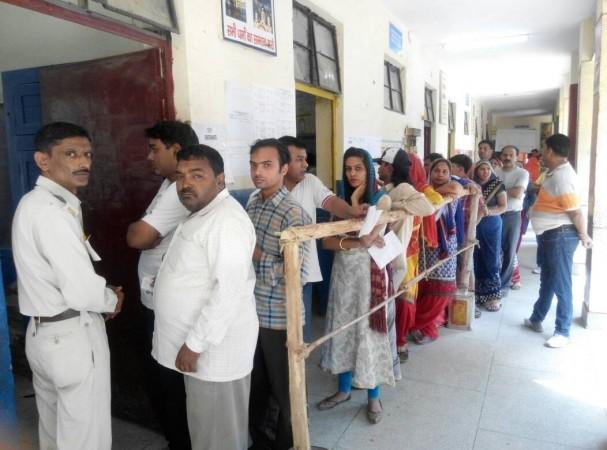
Twenty20 Party, Bharosa Party, Indian Lovers Party, Sabsi Badi Party, Life Peaceful Party and Rashtriya Saaf Niti Party are among 2,293 political parties that will lock horns in the upcoming Lok Sabha elections. However, there are only seven recognised national and 59 recognised regional/state parties.
Over 2,000 parties are in the "unrecognised category" which means that they can't choose an election symbol of their own and would have to select from free symbols provided by the Election Commission.
The Commission has also revealed that they have registered 149 parties in the past one month. To acquire a 'recognised' status, a party must secure a minimum number of votes or seats in state or the Lok Sabha elections.
Weird party names
Over 90 per cent of the political parties in the Lok Sabha elections are unrecognised and have limited to zero locus standi in determining the course of the government formation. A cursory look at the names of some of these political parties evokes special interest. Consider Kerala's Twenty20 Party that has been named after Indian Premier League.
There is a Religion of Man Revolving Political Party of India that primarily delves into the essence of religion in a multi-religious country like India. Another party is Indian Lovers Party that has taken the election symbol of Taj Mahal depicting the values of love and sacrifice, although the party aims to eradicate problems like illiteracy, terrorism, poverty and inflation in India, according to Pioneer.
Amid the increased sloganeering around chowkidars among BJP and Congress, a small political organisation named Jaagte Raho Party highlights the need to be vigilant.
There are also growing apprehensions that some of these parties may not actually contest the elections and may use it for making some quick bucks and converting black money into white. After the 2014 Lok Sabha elections, the Election Commission had directed the Central Board of Direct Taxes to look into the funding of 255 unrecognised parties that did not contest the polls. They were later delisted.

Recognised parties
Despite a staggering number of political parties contesting the polls, the real fight is always perceived to be between the Bharatiya Janata Party and Congress.
Congress, a 130-year-old party founded in 1885, is finding it hard to hold on to its vote bank after it was routed by BJP (founded in 1980) in the last Lok Sabha elections.
There are five other major national parties such as Communist Party of India (Marxist), Communist Party of India, Bahujan Samaj Party, Nationalist Congress Party and All India Trinamool Congress Party which would have a major say in the future government formation especially when there is a likelihood of a coalition rule.
Below is the list of recognised national parties :
1. Bharatiya Janata Party (1980)
2. Indian National Congress (1885)
3. Communist Party of India (Marxist) (1964)
4. Communist Party of India (1925)
5. Bahujan Samaj Party (1984)
6. Nationalist Congress Party (1999)
7. All India Trinamool Congress (1998)
Regional parties :
1. Aam Aadmi Party (AAP) (2012)
2. All India Anna Dravida Munnetra Kazhagam (AIADMK) (1972)
3. All India Forward Bloc (AIFB) (1939)
4. All India Majlis-e-Ittehadul Muslimeen (AIMIM) (1927)
5. All India NR Congress (AINRC) (2011)
6. All India United Democratic Front (AIUDF) (2004)
7. All Jharkhand Students Union (AJSU) (1986)
8. Asom Gana Parishad (AGP) (1985)
9. Biju Janata Dal (BJD) (1997)
10. Bodoland People's Front (BPF) (1985)
11. Desiya Murpokku Dravidar Kazhagam (DMDK) (2005)
12. Dravida Munnetra Kazhagam (DMK) (1949)
13. Haryana Janhit Congress (2007)
14. Hill State People's Democratic Party (HSPDP) (1968)
15. Indian National Lok Dal (INLD) (1999)
16. Indian Union Muslim League (IUML) (1948)
17. Jammu & Kashmir National Conference (JKNC) (1932)
18. Jammu & Kashmir National Panthers Party (JKNPP) (1982)
19. Jammu and Kashmir People's Democratic Party (JKPDP) (1998)
20. Janata Dal (Secular) (1999)
21. Janata Dal (United) (1999)
22. Jharkhand Mukti Morcha (JMM) (1972)
23. Jharkhand Vikas Morcha (Prajatantrik), JVM(P), (2006)
24. Kerala Congress (M), KC(M), (1979)
25. Lok Janshakti Party (LJP) (2000)
26. Maharashtra Navnirman Sena (MNS) 2006
27. Maharashtrawadi Gomantak Party (MGP)1963
28. Manipur State Congress Party (MSCP) 1997
29. Mizo National Front (MNF) 1959
30. Mizoram People's Conference (MPC) 1972
31. Naga People's Front (NPF) 2002
32. National People's Party (NPP) 2013
33. Pattali Makkal Katchi (PMK) 1989
34. People's Party of Arunachal (PPA) 1987
35. Rashtriya Janata Dal (RJD) 1997
36. Rashtriya Lok Dal (RLD) 1996
37. Rashtriya Lok Samta Party (RLSP) 2013
38. Revolutionary Socialist Party (RSP) 1940
39. Samajwadi Party (SP) 1992
40. Shiromani Akali Dal (SAD) 1920
41. Shiv Sena (SS)
42. Sikkim Democratic Front (SDF) 1993
43. Sikkim Krantikari Morcha (SKM) 2013
44. Telangana Rashtra Samithi (TRS) 2001
45. Telugu Desam Party (TDP) 1982
46. United Democratic Party (UDP) 1972
47. YSR Congress Party (YSRCP) 2011
48. Samajwadi Janata Party (Rashtriya), SJP, 1990
49. All India Public Freedom Party (AIPFP) 2016
(Source: Education Today)

















